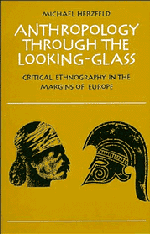Book contents
- Frontmatter
- Contents
- Preface
- Key to symbols
- 1 Romanticism and Hellenism: burdens of otherness
- 2 A secular cosmology
- 3 Aboriginal Europeans
- 4 Difference as identity
- 5 The double-headed eagle: self-knowledge and self-display
- 6 Strict definitions and bad habits
- 7 The practice of relativity
- 8 Etymologies of a discipline
- Notes
- Bibliography
- Index
6 - Strict definitions and bad habits
Published online by Cambridge University Press: 11 March 2010
- Frontmatter
- Contents
- Preface
- Key to symbols
- 1 Romanticism and Hellenism: burdens of otherness
- 2 A secular cosmology
- 3 Aboriginal Europeans
- 4 Difference as identity
- 5 The double-headed eagle: self-knowledge and self-display
- 6 Strict definitions and bad habits
- 7 The practice of relativity
- 8 Etymologies of a discipline
- Notes
- Bibliography
- Index
Summary
Disemia and the politics of morality: individualism versus self-interest
The dualities of disemia represent the play of cultural form and social knowledge and action in political context. In the last chapter, we looked at the uses of such pairs as demotic and purist Greek, and the Hellenic and Romeic stereotypes. Clearly, these pairs are not simply lists of symbols with fixed meanings. On the contrary, they are flexible representations of the dilemma, common to all societies, of balancing social knowledge against the exigencies of collective self-representation to more powerful outsiders. Disemia is the play of cultural contradictions produced by conditional independence - an independence, cultural or political, that is paradoxically enjoyed only on the sufferance of some more powerful entity. Greece, whose War of Independence brought a Bavarian monarchy and foreign-dominated political parties, raised this paradox to exquisitely refined heights of irony. The new state could not afford to allow much questioning of what or who the present-day Greeks were. In such circumstances, legalism flourishes, not only in the passport office, but in all areas of discourse. Lexicography becomes an instrument of national revival and thereafter develops into a state activity. As it does so, its revolutionary activities ossify into prescriptive forms (see Anderson 1983:70–1; Mouzelis 1978:146). In short, meaning becomes an object of official control. Only through meticulous attention to this regulation of discourse can we avoid being seduced by it ourselves. This chapter sets out some exemplary cases from the official/anthropological encounter with ordinary language use in Greece.
- Type
- Chapter
- Information
- Anthropology through the Looking-GlassCritical Ethnography in the Margins of Europe, pp. 123 - 151Publisher: Cambridge University PressPrint publication year: 1988



